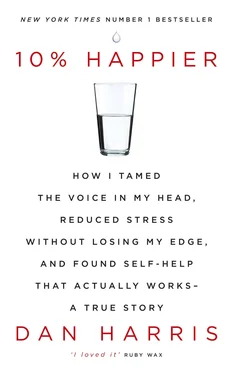Basic Mindfulness Meditation
1. Sit comfortably. You don’t have to twist yourself into a cross-legged position—unless you want to, of course. You can just sit in a chair. (You can also stand up or lie down, although the latter can sometimes result in an unintentional nap.) Whatever your position, you should keep your spine straight, but don’t strain.
2. Feel your breath. Pick a spot: nose, belly, or chest. Really try to feel the in-breath and then the out-breath.
3. This one is the key: Every time you get lost in thought—which you will, thousands of times—gently return to the breath. I cannot stress strongly enough that forgiving yourself and starting over is the whole game. As my friend and meditation teacher Sharon Salzberg has written, “Beginning again and again is the actual practice, not a problem to overcome so that one day we can come to the ‘real’ meditation.”
Pro tips
• To stay focused on the breath, try making a soft mental note, like “in” and “out.” (Don’t get too mesmerized by the note itself, just use it to direct your attention to the actual sensory experience of the breath.)
• “Noting,” as it’s called, can also be useful when something strong—such as itches, pain, worries, or hunger—comes along and drags your attention away from the breath. The act of applying a label—“planning,” “throbbing,” “fantasizing”—can objectify whatever’s going on, making it much less concrete and monolithic. (Don’t get too caught up in thumbing through your internal thesaurus for the right word. Make a note and move on.)
• Another trick for staying focused is to count your breaths. Start at one, and every time you get lost, start over. When you reach ten—if you ever reach ten—start back at one.
• Try to meditate every day. Regularity is more important than duration.
• Set a timer so that you don’t have to check your watch. There are apps for this. (I use something called the Insight Timer.)
• Find friends who are also interested in meditation. It’s not a must, but sitting with a group—or merely having people with whom you can discuss your practice—can have an HOV lane effect.
• Find a teacher you trust. Meditation can be a lonely and subtle business. It really helps to have some personal guidance. If you live in a remote area, there are teachers who offer lessons over Skype.
• Beginning meditators are sometimes advised to sit at the same time and in the same place every day. If, like me, your schedule is unpredictable and involves a lot of travel, don’t worry about it. I sit whenever and wherever I can fit it in.
• Every once in a while, do a little reading about meditation or Buddhism. Even though the basic instructions are simple, hearing them repeatedly can be useful. It’s the opposite of airplane safety announcements. Also, since the practice itself often feels stupid (“in,” “out,” ad nauseam), glancing at even a few passages of a good book can be a helpful reminder of the intellectual underpinnings of the practice, which are extremely compelling. Here are some books I like:
On meditation
Real Happiness, Sharon Salzberg
Insight Meditation , Joseph Goldstein
On Buddhism and mindfulness in general
Going to Pieces Without Falling Apart, Dr. Mark Epstein
Buddhism Without Beliefs , Stephen Batchelor
FAQS
Remind me, what’s the point of this?
Meditation is the best tool I know for neutralizing the voice in the head. As discussed, the ego is often a hatchery of judgments, desires, assumptions, and diabolical plans. The act of simply feeling the breath breaks the habits of a lifetime. For those short snatches of time when you’re focused on the rise and fall of the abdomen or the cool air entering and exiting the nostrils, the ego is muzzled. You are not thinking, you are being mindful—an innate but underused ability we all have, which allows us to be aware without judging.
When you repeatedly go through the cycle of feeling the breath, losing your focus, and hauling yourself back, you are building your mindfulness muscle the way dumbbell curls build your biceps. Once this muscle is just a little bit developed, you can start to see all the thoughts, emotions, and physical sensations that carom through your skull for what they really are: quantum squirts of energy without any concrete reality of their own.
Imagine how massively useful this can be. Normally, for example, when someone cuts you off in traffic or on line at Starbucks, you automatically think, I’m pissed . Instantaneously, you actually become pissed. Mindfulness allows you to slow that process down. Sometimes, of course, you’re right to be pissed. The question is whether you are going to react mindlessly to that anger or respond thoughtfully. Mindfulness provides space between impulse and action, so you’re not a slave to whatever neurotic obsession pops into your head.
My mind keeps wandering. Am I failure?
This question gets back to the whole “clear your mind” misconception. The relationship between thinking and meditating is a funny one. Thoughts are simultaneously the biggest obstacle to meditation, and also an unavoidable part of it—like the opposing team in basketball, or the hurdles in track. The goal is not to erase the obstacles, but to play as well as possible.
So, again: this entire endeavor revolves around moments of mindfulness, interrupted by periods of distraction, then gently catching yourself and returning to the breath. Over time, the mindfulness may grow longer and the wandering shorter. Not incidentally, the ability to begin again and again has significant “off the cushion” benefits. It creates a resilience that can be enormously useful when confronting the ups and downs of everyday life.
How come I don’t feel relaxed? This really sucks.
First of all, when you learn any new skill—Urdu, French horn, krumping, whatever—it is often awkward and difficult at the beginning.
Second, write down this quote from Jon Kabat-Zinn and put it up on your wall: “Meditation is not about feeling a certain way. It’s about feeling the way you feel.”
It’s amazing how many times I can hear this message and yet forget it when I sit down to meditate. You don’t need to achieve some special state; you just need to be as aware as possible of whatever’s happening right now. This is what the Buddhists mean by “letting go”—better translated as “letting be.”
Meditation became much easier for me when I stopped holding myself responsible for what was happening in my head. To this day, as soon as I start meditating, the first thoughts are usually: How the hell am I going to make it until the timer goes off? Why am I even doing this? But I haven’t summoned those complaints. They just come out of the void. So rather than lapse into what Sharon Salzberg calls a “judgment jag,” I just note the thoughts as “complaining” or “rushing” or “doubt.” Yet again, there are massive off-the-cushion consequences to cultivating this attitude. Just because your wife or your kids are driving you nuts does not mean you are a “bad person.” You can’t control what comes up, only how you respond.
You keep talking about this notion that “you can’t help what we feel, only how you respond,” but I want to feel different things. Won’t meditation do that for me?
In my experience, yes, it will. Not right away, of course—and not entirely. But as you learn to stop feeding your habitual thought and emotional patterns through compulsive mental churning, you will make room for new things.
Читать дальше












